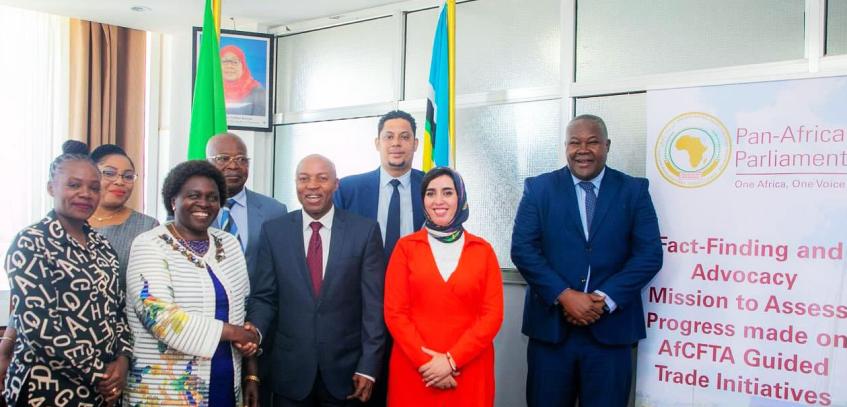Tanzania’s role in driving African integration has been praised by a delegation from the Pan-African Parliament Committee on Trade, Customs and Immigration Matters during a meeting with the country’s Deputy Minister of Foreign Affairs and East African Cooperation, Hon. Cosato Chumi (MP), in Dodoma.
The meeting was part of a working visit by the Pan-African Parliament Committee , which is in the country to assess progress on the implementation of the African Continental Free Trade Area (AfCFTA) Guided Trade Initiative (GTI).
In his remarks, Deputy Minister Chumi highlighted Tanzania’s strategic role in promoting trade across the continent through AfCFTA, a flagship initiative under the African Union’s Agenda 2063. Tanzania is one of the eight pilot countries selected for the initial phase of the GTI, alongside Kenya, Rwanda, Ghana, Egypt, Mauritius, Cameroon, and Tunisia.
"Tanzania has been an active participant in intra-African trade, particularly within the East African region and across the continent through AfCFTA. Being one of the pioneering countries in the GTI reflects our commitment to strengthening trade links across Africa," Chumi stated.
Pan-African Parliament delegation leader, Hon. Prof. Margaret Kamar (Kenya), praised Tanzania’s commitment to African integration, noting that the country has always been at the forefront of driving unity across the continent.
She pointed out that Tanzania’s history of leadership in African affairs dates back to its founding fathers, who played a key role in establishing the Organisation of African Unity (OAU), the precursor to the African Union.
"Tanzania’s legacy in fostering African unity and its early ratification of key protocols under AfCFTA further underscores its commitment to a prosperous and integrated Africa," said Hon. Kamar. "The efforts we’ve witnessed here in Tanzania demonstrate that this nation remains a key player in Africa’s quest for integration and development."
During the discussions, the Pan-African Parliament delegation also commended the Government of Tanzania for its successful implementation of business reforms, particularly in infrastructure development. Prof. Kamar noted that improvements in roads, railways, and other essential infrastructure have significantly enhanced Tanzania's connectivity with its neighbors, thereby boosting trade opportunities across the continent.
“One of the regions we visited before arriving in Dodoma was Arusha, where we saw firsthand the impact of infrastructure improvements. The well-maintained roads enabled us to travel with ease, reflecting the government’s commitment to facilitating trade,” she added. "This is a great example to other African countries, showing that regional integration can be achieved when solid foundations are laid."
The Pan-African Parliament delegation also applauded Tanzania’s efforts in ratifying and domesticating key African Union protocols aimed at advancing regional integration. In particular, Tanzania’s swift action in implementing agreements such as AfCFTA, along with protocols on the free movement of people and goods, positions it as a leader in fostering continental unity.
Deputy Minister Chumi further emphasized Tanzania’s efforts to educate local traders on how to tap into new markets under AfCFTA. He noted that collaboration between the government and business associations, such as the Tanzania Private Sector Foundation (TPSF) and the Tanzania Chamber of Commerce, Industry, and Agriculture (TCCIA), is crucial to enhancing traders' understanding of cross-border opportunities.
“Public education remains essential in ensuring that our business community fully grasps the opportunities that the AfCFTA brings. We are committed to expanding the market for Tanzanian goods and creating a conducive environment for doing business across Africa,” Chumi said.
Ambassador Stephen Mbundi, Permanent Secretary of the Ministry of Foreign Affairs and East African Cooperation, highlighted key achievements in Tanzania’s trade infrastructure, including reliable electricity, modern road networks, an enhanced railway system, and the expansion of the national airline, which now includes cargo planes capable of transporting goods globally.
“Tanzania’s investment in infrastructure has greatly facilitated the movement of goods, and the GTI has already enabled us to export value-added products such as sisal, coffee, spices, and peanuts,” said Ambassador Mbundi.
The Pan-African Parliament delegation emphasized the importance of further enhancing the free movement of people across African borders, a critical aspect of AfCFTA that is still being refined. They underscored the need for clear guidelines to enable smooth and unrestricted mobility, which will further drive economic integration.
Tanzania’s ongoing commitment to African unity, its proactive role in ratifying AU protocols, and its leadership in implementing the AfCFTA place it at the heart of the continent’s drive towards economic integration and prosperity. As the Pan-African Parliament delegation observed, the country’s longstanding dedication to the ideals of unity and cooperation continues to shape its approach to modern African challenges.
In this regard, Pan-African Parliamentarians advocated for the ratification of the Protocol to the Treaty Establishing the African Economic Community—related to the Free Movement of Persons, the Right of Residence, and the Right of Establishment—as crucial to unlocking the full potential of the AfCFTA. Tanzania has signed it but has yet to ratify. The Ministry of Foreign Affairs assured that it is diligently working on this, with several measures to facilitate the free movement of Africans already in place in the country.








